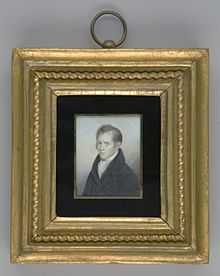Jonathan Leavitt

Jonathan Leavitt (1764–1830) was a prominent Greenfield, Massachusetts attorney, judge, state senator [1] and businessman for whom the architect Asher Benjamin designed the Leavitt House, now the Leavitt-Hovey House on Main Street, in 1797.[2]
Judge Leavitt was born in Walpole, N.H., but was raised in Greenfield, where his father Rev. Jonathan Leavitt served as a Congregational minister.[3] Leavitt attended Yale College, taught school in New Haven, and then achieved early prominence as a lawyer in Greenfield. He subsequently served as Chief Justice of the Court of Common Pleas in 1812, and Judge of Probate from 1814 to 1821.[4] Judge Leavitt used the west wing of the Leavitt-Hovey house for his business activities. He was a founder and first president of The Franklin Bank of Greenfield in 1822.

Judge Leavitt was also known for his legal writings, especially in probate law, as well as his "Summary of the Laws of Massachusetts, Relative to the Settlement, Support, Employment and Removal of Paupers", published in Greenfield in 1810.[5] He also published two small volumes on religion.[6]
Judge Leavitt married Emelia Stiles, daughter of President Ezra Stiles of Yale College, for whom today's Ezra Stiles College at Yale is named. Rev. Jonathan Leavitt, Judge Leavitt's father, was also a graduate of Yale and a native of Suffield, Connecticut. Rev. Leavitt's wife was Sarah Hooker, great-great-granddaughter of the Rev. Thomas Hooker, New England divine and chief founder of the Colony of Connecticut.
Members of the Leavitt family became prominent in nearby Charlemont and Heath, and were noted for their abolitionist activities. (Rev. Joshua Leavitt, born in nearby Heath, Massachusetts, was a member of this family.) Judge Leavitt's household had three African-American servants, and on the death of her father Ezra Stiles Mrs. Leavitt inherited her father's two elderly slaves Newport and his wife Nabby.[7]
Judge Leavitt died in Greenfield in 1830. He and the former Emelia Stiles had four daughters, including Sarah Hooker Leavitt, Mary Hooker Leavitt, Emilia Stiles Leavitt (later Mrs. E. T. Foote), and a son Jonathan, who died in 1821 while attending Yale College, an event that threw his father into profound depression.[8] In 1822 his sister compiled a memoir devoted to her brother entitled "Memoir of Jonathan Leavitt, a Member of the Junior Class in Yale College, who Died at New-Haven the 10th of May, 1821, Aged 18 Years."[9] The book, whose author was described as "a sister", was published by S. Converse in New Haven in 1822.[10]

See also
| Wikimedia Commons has media related to Jonathan Leavitt. |
References
- ↑ Jonathan Leavitt served as a state senator in 1818, having served earlier as a state assemblyman in 1802 and 1803.
- ↑ Early photo of Jonathan Leavitt House, Greenfield, Genealogy of the Ancestors and Descendants of John White of Wenham and Lancaster, Mass., Almira Larkin White, Nichols, Haverhill, 1905
- ↑ Biographical Sketches of the Graduates of Yale College, Vol. IV, Franklin Bowditch Dexter, Henry Holt and Company, New York, 1907
- ↑ History of Greenfield, Francis McGee Thompson, T. Morey & Son, Greenfield, 1904
- ↑ Summary of the Laws of Massachusetts, Relative to the Settlement, Support, Employment and Removal of Paupers, Jonathan Leavitt, printed by John Denio, Greenfield, 1810
- ↑ Biographical Sketches of the Graduates of Yale College with Annals of the College History, Vol. IV, Franklin Bowditch Dexter, Henry Holt & Co., New York, 1907
- ↑ American Architects and Their Books to 1848, Kenneth Hafertepe, James F. O'Gorman, University of Massachusetts Press, 2001
- ↑ The Descendants of Rev. Thomas Hooker, Hartford, Connecticut, 1586–1908, Edward Hooker, Margaret Huntington Hooker, Rochester, N.Y., 1909
- ↑ Obituary of Jonathan Leavitt, The Christian Spectator, Howe & Spalding, New Haven, 1821
- ↑ A Dictionary of Books Relating to America, from Its Discovery to the Present, Joseph Sabin, Wilberforce Eames, Bibliographical Society of America, Robert William Glenroie Vail, Joseph Sabin (publisher), New York, 1878
External links
|